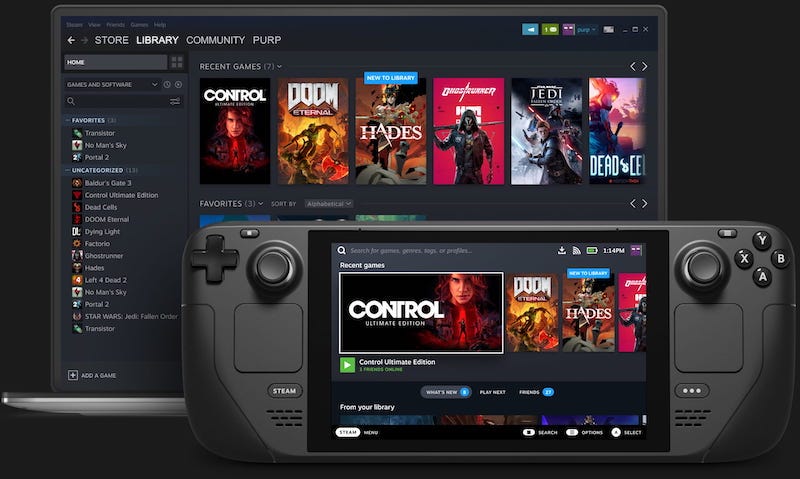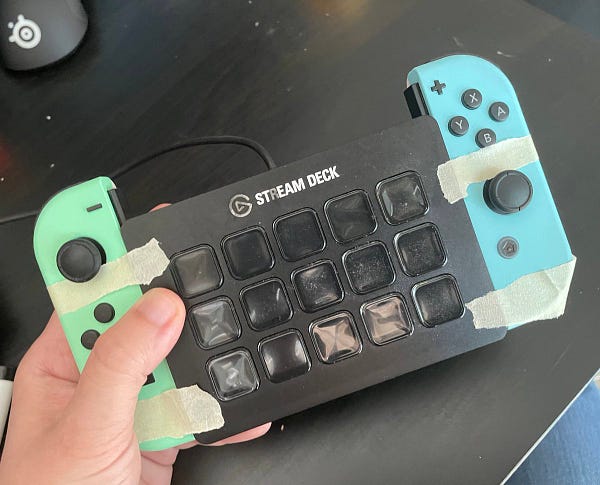Let's talk about Steam Deck, shall we?
Publikováno: 15.7.2021
That one sneaked up on us a bit.
[The GameDiscoverCo game discovery newsletter is written by ‘how people find your game’ expert & GameDiscoverCo founder Simon Carless, and is a regular look at how people discover and buy video games in the 2020s.]
We don’t specialize in motivational speeches here at GameDiscoverCo. But look - it’s a brand new day, there’s players out there ready to be entranced by your games, the world is your lobster, Steam just announced a new handheld ‘console’…
…wait, they did WHAT? Guess that’s the lead story on this newsletter, then.
[Reminder: we just launched our paid sub-exclusive ‘Complete Game Discovery Toolkit’ eBook, and subscribers also get Discord, an exclusive weekly newsletter, Hype data access, and more. So sign up & help us out if you feel like it!]
Steam Deck - it’s real and it’s spectacular!
OK, so it was only announced a couple of hours ago. But I presume most of you have already heard of Steam Deck, Valve’s much rumored but finally materializing handheld device.
For anyone who isn’t completely up to date: it’s a 7” controller & touchscreen-based standalone handheld debuting in December which runs SteamOS (Steam’s Linux-based operating system), and can use your Steam library of Windows games using Valve’s Proton compatibility layer.
It costs anywhere from $399 USD (64GB of storage) to $649 (512GB of storage), with faster storage on the higher tier models. And there’s already a lot of good coverage out there - particularly from IGN, which got some exclusive pre-announce coverage. So check out their detailed hands-on comments, plus a very useful 31-question FAQ for lots more specifics.
But while all our minds are racing, I’ll try to provide some less-obvious angles. Before we get started, here’s the official Valve video (via a new Steam Deck section in Steamworks!) - for 7 minutes of dev-centric info on the platform:
Beyond this, here’s some extra insight, and things that struck us at GameDiscoverCo:
The Steam Deck is set up so that your games should ‘just work’ on it - more on this shortly. But Valve is trying to set aside some devkits: “We are building these right now, and quantities will be limited. Once available, partners will be able to request a dev-kit from the partner site hardware request form. We will keep track of all units requested, as more dev kits will be available as we get closer to launch.”
This is a Linux-based handheld, but you won’t need Linux versions of your games running, due to Proton ‘translating’ the Windows versions. (I’m not sure everyone appreciates how well Proton works with Unity and Unreal Engine games nowadays! More tips - including a link to Proton compatibility issues - via this Steamworks page.)
There’s been a bit of ‘you can use any store with the Steam Deck, just not Steam!’ rhetoric. And that’s somewhat true, but I think maybe confusing? Citing this exchange: “IGN: Can I log into my Epic Games Store account? Greg Coomer: Again, you can really do anything that you would expect a [Linux-based] PC to be able to do. So the answer to those things is yes.” Well, yes, but Epic Games Store itself has no Linux support - there’s things like the Heroic Games Launcher that may bridge this. But it’s not going to be user-friendly in the slightest compared to SteamOS & Proton. (At least not yet.) Guess you could buy and install Windows on your Steam Deck, but I wonder what effect that would have on battery performance?
Beyond just the dev-centric elements, Axios’ Stephen Totilo notes that sizewise, the Steam Deck is a little heftier than other Nintendo-y handhelds you’ve been releasing games on: “Standard Nintendo Switch: 9.4 x 4 x .55 inches / .9 pounds ; Steam Deck: 11.7 x 4.6 x 1.9 inches / 1.5 pounds.” I think it’ll work, but it’s definitely got a bulkier form than many might be accustomed to.
Talking of hardware: much like Valve’s likely too-early Steam Machines, the company is very happy to have other manufacturers make Steam Decks. Valve’s Greg Coomer notes in the IGN FAQ article: “We look at this as just a new category of device in the PC space”, and Lawrence Yang adds: “We want to make sure people know that the SteamOS 3 is available free, for a free license for any manufacturer that wants to make a similar product.” Sorta like a free version of the 3DO specs - but hopefully more popular! I think we’ll see a few third parties jumping on this.
Finally, we have some initial comments from Valve’s Gabe Newell via an IGN interview video excerpt. And he’s definitely emphasizing that the company is in it for the long haul. It’s true that this is an offshoot of a multi-year process with SteamOS, and Gabe notes: “Our assumption is these are long-term decisions that we are making about how we can contribute to the health and the vitality of this ecosystem.” So it’s a ‘look, handheld gaming PCs can finally work while not using Windows’ pitch, I think?
Then, of course, there’s this angle. And this a completely true statement, guv’nor:
It’s a tad early to work out what’s really going to happen. And Steam Deck is expensive compared to Nintendo Switch. But I’ve made no secret of the fact that I appreciate Steam’s broadly egalitarian approach to how they run their platforms. (Even if their platform cut could take a haircut and leave them plenty profitable, ahem.) So it’s going to be interesting to see how this goes…
Google Stadia: the bargaining begins…
Another platform has been making announcements this week, so we should actually cover them as well, right? And it’s Google Stadia, which announced at the Google Game Developers Summit earlier this week that “starting on October 1st, Google will take 15 percent of sales up to $3 million [instead of 30%] through the end of 2023.” (An overview of all Google x game dev announcements here, btw.)
Also, as GI.biz noted, the company is giving “any title included in Stadia Pro -- which gives subscribers access to a library of games for a monthly fee -- a share of the money generated by the service”, in addition to the one-off fee that games get for being on Stadia Pro.
The method of monetization has created some controversy, since “70% of all monthly revenue generated by the Pro subscription will be split between partners based upon how many ‘session days’ players have spent on their games.” In other words, it’s rewarding games that people return to day after day. Oh, and one other interesting note: “Developers will receive $10 for every new user they help to convert to a Stadia Pro subscriber, tracking which users click on studios' unique Click To Play links.”
Anyhow, some outlets like Axios have run stories about dev being ‘spooked’ by the pay-for-more-engagement angle. Which is fair, and runs right into the discussion around short/niche game fit that we were just having. I also agree it’s further accentuating the Games As A Service pressure if you ship on one of these services.
But this isn’t tremendously different to how other game subscription services have treated this. Google has just been more upfront about it, in an attempt to lure devs in their direction. Specifically, other services like Apple Arcade reportedly have post-release payments related to ‘engagement’ on the service. (Xbox Game Pass also reportedly rewards top-downloaded Game Pass games with spot bonuses - although only the highest tier.)
But in general, it does seem like we’ve reached the ‘we’re not doing great, dev engagement-wise - let’s make devs more excited about our platform by giving them more money’ stage for Stadia. Which I think is the only natural thing to do for Google. I’m not sure it makes any difference to the long-term prospects for Stadia. But I like the ‘15% platform cut’ angle, since it’s another platform using cut as a bargaining chip, and may up the pressure for others…
Conclusion!
And that’s it for this week, free subscribers. Next up: we’ve a heap of smaller links to catch up on on Monday, since Steam Deck blasted its way squarely into our normal newsletter writing time, and a Plus-exclusive game analysis newsletter for tomorrow!
But we leave you with my former Gamasutra colleague Alissa McAloon’s attempt to beat IGN at their own ‘Steam Deck exclusives’ game:
[We’re GameDiscoverCo, a new agency based around one simple issue: how do players find, buy and enjoy your premium PC or console game? You can subscribe to GameDiscoverCo Plus to get access to exclusive newsletters, interactive daily rankings of every unreleased Steam game, and lots more besides.]




